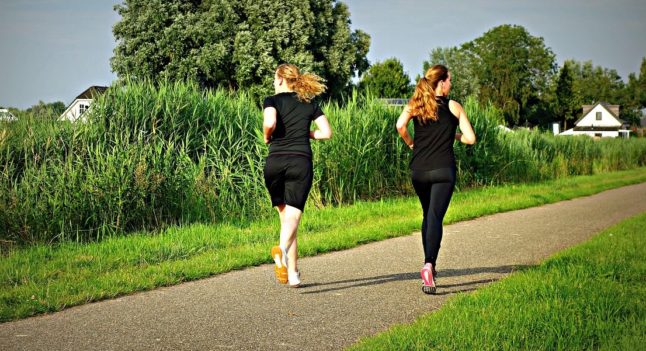EXPLAINED: Switzerland's official advice on how to protect yourself in a heatwave

As temperatures have climbed past 30C in many regions of Switzerland, and more of the same is expected in the next days, protecting yourself from the dangers of extreme heat is essential, health officials say.
Scorching weather is expected is continue throughout this week, according to the forecast from the official meteorological service MeteoSwiss, which predicts temperatures exceeding 30C in all regions of Switzerland until the weekend.
If you are a sun worshipper, you will be in your element, but don’t forget that "heat impacts our wellbeing and can be dangerous for our health,” the Federal Office of Public Health (FOPH) has warned.
"That is why it is important to take precautions during hot days, tropical nights and heatwaves," FOPH said.
FOPH has issued recommendations on how everyone, and especially people in risk groups, can weather (no pun intended) the extreme heat.
Who is included in the ‘risk groups’?
According to FOPH, high temperatures present a particular danger to the elderly; people with chronic illnesses such as cardiovascular, respiratory diseases, and diabetes; pregnant women; as well as babies and small children.
People with dementia and mental health disorders also fall into a ‘high-risk’ group because they may not be able to take care of themselves.
However, even the ‘healthy’ people could suffer from the conditions typically associated with very hot temperatures — for instance, dehydration and heat stroke.
These are the symptoms you should pay particular attention to during heatwaves:
- Weakness and fatigue
- Confusion, dizziness, impaired consciousness
- Headache
- Muscle cramps
- Dry mouth
- Nausea, vomiting, and diarrhoea
- High body temperature
- Heavy sweating
- Rapid pulse
If you, or anyone around you, experiences any of these symptoms, FOPH recommends taking immediate actions such as:
- Find a cool or shady area
- Lie down
- Cool yourself with damp towels
- Drink fresh water
If the condition doesn’t improve within a short time, you should call emergency services at 144.
All of the above are the results of over-exposure to heat, which you should avoid by following FOPH recommendations:
Pay attention to heat alerts
Both MeteoSwiss and AlertSwiss issue warnings when heat levels are dangerous to health. Currently, there are several heat warnings in place including level 4 out of 5 alerts in some parts of southern and western Switzerland.
What should you do when that happens?
In this case (or if there are no alerts, but you feel very hot and are sweating a lot), you should avoid direct exposure to the sun, stay in the shade and in cool places.
You should also not do strenuous physical activity during the hottest time of day, opting for early morning or late evenings instead; drink at least 1.5 litres of water each day; wear light and loose-fitting clothing ; and take cool showers.
“Cooling lotions, cold towels on the forehead and neck, plus cold foot and hand baths help cool your body a well,” FOPH said.

You should not jog during hottest time of the day. Photo: Pixabay
Keep your home cool
Right now you are probably dreaming of a cool, air-conditioned room, but unfortunately Switzerland is not a good country for that.
READ ALSO: Why getting permission for air conditioners is so hard in Switzerland
There are, however, some measures you can take to keep your home a bit cooler, which is easier in new than old buildings.
If you are lucky enough to live in a ‘Minergie’ home, which are designed with thermal insulation and an automatic ventilation system for good air circulation, you will stay comfortably cool.
READ ALSO: What are ‘Minergie’ homes in Switzerland?
Even new buildings that don’t fall under the ‘Minergie’ label usually have better insulation — and more protection from heat — than old ones.
If you happen to live in an apartment without good insulation and air circulation, FOPH recommends that you open shutters / blinds and windows early in the morning and in the evening when the outside temperature is lower than indoors.
During the hottest part of the day, however, close the shutters and windows.
It also goes without saying that, when outdoors, you should use sunscreen with a broad UVA/UVB spectrum and apply it regularly throughout the day.
And (do we really have to say it?) NEVER leave children or pets in parked cars!
Comments
See Also
Scorching weather is expected is continue throughout this week, according to the forecast from the official meteorological service MeteoSwiss, which predicts temperatures exceeding 30C in all regions of Switzerland until the weekend.
If you are a sun worshipper, you will be in your element, but don’t forget that "heat impacts our wellbeing and can be dangerous for our health,” the Federal Office of Public Health (FOPH) has warned.
"That is why it is important to take precautions during hot days, tropical nights and heatwaves," FOPH said.
FOPH has issued recommendations on how everyone, and especially people in risk groups, can weather (no pun intended) the extreme heat.
Who is included in the ‘risk groups’?
According to FOPH, high temperatures present a particular danger to the elderly; people with chronic illnesses such as cardiovascular, respiratory diseases, and diabetes; pregnant women; as well as babies and small children.
People with dementia and mental health disorders also fall into a ‘high-risk’ group because they may not be able to take care of themselves.
However, even the ‘healthy’ people could suffer from the conditions typically associated with very hot temperatures — for instance, dehydration and heat stroke.
These are the symptoms you should pay particular attention to during heatwaves:
- Weakness and fatigue
- Confusion, dizziness, impaired consciousness
- Headache
- Muscle cramps
- Dry mouth
- Nausea, vomiting, and diarrhoea
- High body temperature
- Heavy sweating
- Rapid pulse
If you, or anyone around you, experiences any of these symptoms, FOPH recommends taking immediate actions such as:
- Find a cool or shady area
- Lie down
- Cool yourself with damp towels
- Drink fresh water
If the condition doesn’t improve within a short time, you should call emergency services at 144.
All of the above are the results of over-exposure to heat, which you should avoid by following FOPH recommendations:
Pay attention to heat alerts
Both MeteoSwiss and AlertSwiss issue warnings when heat levels are dangerous to health. Currently, there are several heat warnings in place including level 4 out of 5 alerts in some parts of southern and western Switzerland.
What should you do when that happens?
In this case (or if there are no alerts, but you feel very hot and are sweating a lot), you should avoid direct exposure to the sun, stay in the shade and in cool places.
You should also not do strenuous physical activity during the hottest time of day, opting for early morning or late evenings instead; drink at least 1.5 litres of water each day; wear light and loose-fitting clothing ; and take cool showers.
“Cooling lotions, cold towels on the forehead and neck, plus cold foot and hand baths help cool your body a well,” FOPH said.

Keep your home cool
Right now you are probably dreaming of a cool, air-conditioned room, but unfortunately Switzerland is not a good country for that.
READ ALSO: Why getting permission for air conditioners is so hard in Switzerland
There are, however, some measures you can take to keep your home a bit cooler, which is easier in new than old buildings.
If you are lucky enough to live in a ‘Minergie’ home, which are designed with thermal insulation and an automatic ventilation system for good air circulation, you will stay comfortably cool.
READ ALSO: What are ‘Minergie’ homes in Switzerland?
Even new buildings that don’t fall under the ‘Minergie’ label usually have better insulation — and more protection from heat — than old ones.
If you happen to live in an apartment without good insulation and air circulation, FOPH recommends that you open shutters / blinds and windows early in the morning and in the evening when the outside temperature is lower than indoors.
During the hottest part of the day, however, close the shutters and windows.
It also goes without saying that, when outdoors, you should use sunscreen with a broad UVA/UVB spectrum and apply it regularly throughout the day.
And (do we really have to say it?) NEVER leave children or pets in parked cars!
Join the conversation in our comments section below. Share your own views and experience and if you have a question or suggestion for our journalists then email us at [email protected].
Please keep comments civil, constructive and on topic – and make sure to read our terms of use before getting involved.
Please log in here to leave a comment.